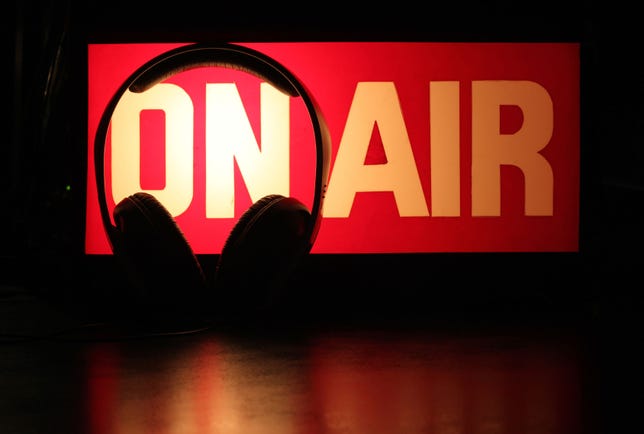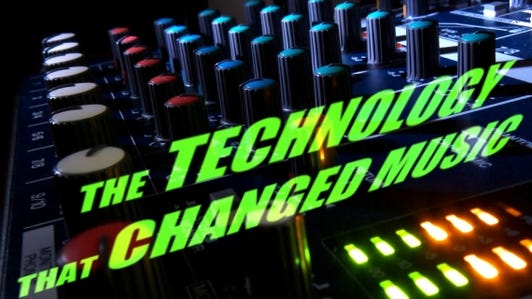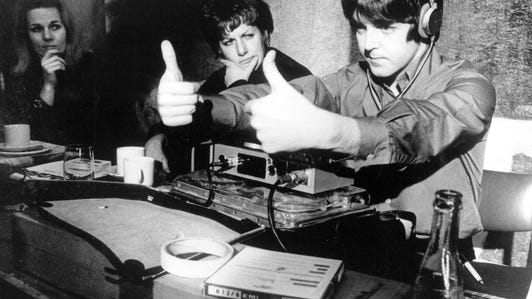
iStock
With its new 24-hour global Beats 1 radio station streaming music and chat to Apple devices worldwide, Apple has launched the most high-profile Internet radio station ever. Is this the beginning of the end for broadcast radio? We spoke to UK-based radio station and publisher TeamRock to find out why — just before the Apple Music launch — the British-based station ditched broadcast and went global by moving entirely online.
TeamRock’s rock and metal-focused programmes have already been available over the Internet, via the station’s website or through an app on your smartphone. But as of this month, “We’re no longer going to be available on DAB,” explains TeamRock’s Head of Audio Hugh “Moose” Evans. Although the station’s schedule and content is still the same, the company, which also publishes rock-focused magazines, won’t be broadcasting over the air because of the limitations of broadcast radio in general and the UK’s digital audio broadcast (DAB) system in particular.


TeamRock
For UK listeners, DAB is marketed as a step up from traditional AM or FM radio, giving access to a wider range of stations and offering extras like track information on your radio’s screen. But Moose explains that DAB “is a UK-only platform, broadcasting in mono, and allows pretty poor coverage for about 65 percent of the country. It confines our thinking and how we cater for this audience.”
Despite its limitations, DAB radio isn’t going anywhere. A second DAB multiplex — the technical term for a chunk of electromagnetic spectrum — is being opened by infrastructure company Arqiva with commercial radio stations Bauer and UTV. Fifteen new stations will launch in 2016, including spin-offs of TalkSport, Kiss and Magic, as well as a relaunched Virgin Radio. “The beginning of 2016 will see the biggest expansion in the UK radio lineup for a generation,” says UTV’s Chief Operating Officer Scott Taunton, “with more choice for listeners than ever before.”
Why move online?
But TeamRock’s Moose worries that the advent of radio-style content via online and mobile means DAB may have missed the boat. “The irony is it’s taken 20 years to finally make it popular, but its days are numbered as a delivery device. The world has changed in the two years that we’ve been at it. The way that the music is licensed and what we’re able to do online has changed completely. Every single device is not pointing towards DAB radio, it’s pointing towards mobile.”


Ollie Millington/Redferns/Getty Images
The rise of online and mobile is a global trend, Moose argues, “and, if anything, places like Korea and even the US are telling us that things are changing at the speed of light. If you don’t think it’s going to happen here, do so at your peril.”
Referring to the former BBC Radio 1 superstar DJ poached to front Beats 1, Moose argues that, “Zane Lowe going to Apple is a great indicator of what’s coming.” He believes that there will be no distinction between online streaming services and radio, because they will offer the same thing. “Really we’re in a race with Spotify. Spotify is significantly larger than us and they have a lot more money than us at the moment. So our future lies [online] without question, and so that is where we must go.”
Can I listen to Internet radio in my car?
TeamRock’s move online drew flak from dedicated DAB listeners, especially those who listened in their car. Cars are still more suited to traditional radio than Internet radio and app streaming — for the moment. “The smart car isn’t here yet,” says Moose, “but it’s not a foreign concept. At the rate at which technology is adopted these days, even by Luddites, people know what a connected car is. I can Bluetooth to my car and I don’t have any kind of fancy car. You could quite easily stream us in a relatively modern car.”


TeamRock
There are still barriers to this connected automotive future, however. “The challenge that we have is coverage. The Wi-Fi and the 3G and 4G is not very good in the UK, unfortunately,” says Moose, who recently tested the theory by broadcasting the TeamRock breakfast show live from a mic connected to the Wi-Fi in various London Underground stations.
How do you make radio pay?
So what does this changing radio landscape mean for stations that continue to focus on broadcast? In a world where people have come to think of radio as free, it’s a tough business to make money. In the UK, the BBC’s eclectic radio stations are funded by the licence fee, effectively a tax, while commercial radio stations are funded by advertising. The only problem is, nobody likes ads. “We know from every bit of research,” said Moose, “and from every focus group and every listener group and everything that we do, the first thing that always comes up is that people don’t like the ads.”
And adverts doesn’t work anyway for a niche concern like TeamRock, which appeals to an audience that is both limited in size and mixed in demographics. “I have no idea about listening figures, I couldn’t tell you,” said Moose. “Quite frankly, I’m not that bothered. We don’t even know what our audience profile is in terms of demographics. We are specifically for people who like the music, who like rock, and we believe they are of all ages and all backgrounds and all creeds and colours and everything in between.”
From wax cylinders to Auto-Tune: The technology that changed music






+33 more
Radio is a sound salvation
- Hard-rockin’ radio station to broadcast from London tube, using public Wi-Fi
- Apple hires Zane Lowe, one of UK’s biggest-name DJs
- Pandora, Apple Music, Slacker and TuneIn: Which online radio app is right for you?
- Rdio streams globally, thinks locally with curated stations
- Music and technology: The triumph of the human ear
“I’ve always been part of a group that hasn’t had the balls to play Slayer at 8 o’clock in the morning, even though people wanted it,” complains Moose. “I used to work for the most popular rock station in Winnipeg, my home town, and in 1992 we said, ‘Man, we need to play Metallica.’ Metallica, they’d been around for, what, 10, nine years. [The station was] afraid because of advertisers, so advertisers don’t want to hear Lamb of God screaming next to them selling their settees.” Now, TeamRock isn’t beholden to advertisers — or the rules of local regulator Ofcom either.
With ads a poor fit for either listeners or TeamRock, the company operates a subscription model instead, with listeners tempted to subscribe to TeamRock’s magazines, such as Metal Hammer and Classic Rock. Or you can opt for a TeamRock+ subscription offering premium content on the website for £25 (around $40 or AU$55) per year.
What are the challenges of online radio?
Being an online concern opens up a vast global audience, but brings its own challenges. “All of a sudden we’re competing with millions of niche streams,” says Moose. “The assumption that because we’re quality we’re going to be found, that’s just not true any more. So it’s going to require some marketing, it’s going to require some focused marketing on festivals around the world and the communities around the world who hopefully will then find it and trial it and understand it.
And the Beats goes 1
- Everything you need to know about Beats 1 and Apple Music
- How to get Apple Music on your iPhone, iPad, Mac and PC
- 5 ways to improve your Apple Music listening
- Spotify, Apple Music, Rdio and Rhapsody: Which music streaming app is right for you?
“I’d like to have shows that represent countries around the world. What’s going on in the Czech Republic, is there a scene there? Could we get stringers? Ultimately the content should be just as relevant to somebody in Bangalore as it is in Bolton. You should be able to switch on anywhere in the world and go, ‘Oh, yeah, OK, I get this.'”
The spirit of radio
Despite the backlash, Moose believes the future of radio is onine and global. “Maybe we shouldn’t have been on DAB in the first place,” he admits. “But we can’t stay. We just can’t. It would be suicide to do so.”
Moose still believes in the spirit of radio. “I love radio. Radio must still exist,” he says. “The delivery will change, but what is radio? All we’re talking about is how it’s delivered. Radio always has that personal relationship. You’re a companion and you form a relationship with the people on the radio. The idea behind radio will remain.”




